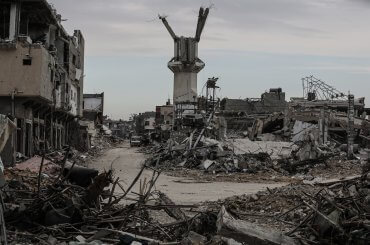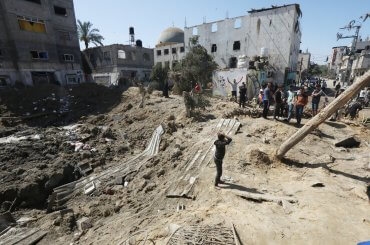As fifty children lose their homes under the auspices of the Supreme Court the question should be asked: Does the Supreme Court act in the service of a racist ideology in the spirit of Rabbi Eliyahu and his cohorts?
One morning, when the storm started shaking the treetops and the dogs howled in terror because of the thunders and the flashes of lightning, fifty children of different ages went out to school in the city of Lod, Israel. During the day most of them worked diligently on their studies, hoping the storm would abate so they could go back safely to the home where they were born and raised. To the sound of the bell announcing the end of the day they all set off running back home. The tempest intensified, and with it the will to find oneself in the warmth of one’s home; in the warmth of the seven homes of their extended family – the Abu Eid family.

A student returns to a destroyed home in Lod. (Photo: alarab.net)
But when they got home, the home was utterly destroyed. Fifty children stood shocked in front of their seven demolished homes, the uprooted palm tree and the water bursting out of the broken pipe; they stood frozen in front of the offhandedly thrown out furniture and the cries of their mothers facing the destructive power all by themselves. And who is it that had destroyed their home? It was not the tempest that wrecked the homes of the fifty children, nor was it the conflagration of forest fires; the culprits were demolition contractors of the Judeo-democratic State of Israel, backed by the Judeo-democratic Supreme Court, who utterly destroyed the children’s homes, accompanied by the gloating looks on the faces of their Jewish neighbors.
Could it be that the Court did not consider the welfare of the children, citizens of the state, only because of their Palestinian ethnicity? Now that the slogan for the Judaization of Lod is back, may we suspect the Supreme Court of once again taking an active part in the crimes of racism and in the renewing of the Nakba?
When hip hop band DAM’s Suhell Nafar and I arrived, everything was already in ruins: heaps of rubble in the heart of the neighborhood for all to see and beware. Suhell photographed the ruins. I wiped a tear. But rage is in order here, not pity. We must be strong and think of ways to struggle. Meanwhile, a protest tent and a shelter for the families have been set up nearby. The demolishers did not leave a house or two for the families to take refuge in, nor did they wait for the spring in order to alleviate the suffering. It seems they wanted the destruction to be as painful and humiliating as possible.
Thinking about Transfer
There are many forces in the Israeli politics which hope the Palestinians in Israel will rebel, and so in due course it should be possible to expel them from the country. They say they do not seek a final solution, as they oppose genocide; they are not barbarians. They only want to make sure the Arabs don’t multiply like rabbits on Israel’s holy land. That’s why there are loyalty laws; that’s why there is constant encroachment upon their living space; that’s why more and more actions that distance the Arab citizens of Israel from the state are taking place.
Destroying a home is a cruel action in any context, but it’s even crueler when it serves to emphasize who is allowed to stay in their home even without permission and who isn’t. The Supreme Court is aware of the neighboring Jewish neighborhood, Ganei Aviv, which was approved retrospectively. The Supreme Court is aware of the fact that for the Jewish neighborhood a bridge was built over the railroad tracks so that Jewish children would not be run over, while for the Arabs the railroad was laid inside the neighborhood without a single bridge. The Supreme Court is aware of the neighborhoods which are being built for the religious settlers in Lod instead of a luxurious neighborhood for these Arabs whose land the state covets.
The Supreme Court knows that in the mixed cities of Jaffa, Acre and Lod cruel creeping deprivation of Israeli citizens of Palestinian ethnicity of what is theirs is taking place.
The Court knows and collaborates. With my own eyes I saw Her Honor Dorit Beinisch de facto and retrospectively approving a blatantly illegal new settler neighborhood situated on the robbed land of Bil’in. One cannot but wonder why she won’t retroactively approve a neighborhood of Palestinians in Lod, where they’ve been living for decades.
I accuse the Supreme Court of the State of Israel of being a loyal servant of a racist ideology which does not differ much from the racism of the rabbis who have signed the manifesto of the Israeli Nuremberg Laws. Like the court in Shakespeare’s The Merchant of Venice, which bends the civil law in favor of the Christian ruler in order to harm Shylock the Jew, the Supreme Court in our reality has become a verbal whitewashing machine for occupation and plundering on a nationalist basis.
Does Judge Beinisch really believe that there is a fundamental difference between expulsion under the guise of democracy and expulsion under the guise of theocracy? Is there a difference between the Jewish National Fund, which forbids leasing lands to Arabs on nationalist grounds, and the fascist rabbi Eliyahu of Safed, who forbids it on religious grounds? For the Palestinian, they are both parts of the same well-oiled machine, which advances his banishment from the public space and preserves him as a stranger in his homeland.
Memories from Shakespeare
A month ago I saw Al Pacino playing the role of his life as Shylock on Broadway. Having deprived him of all his possessions, the enlightened people of Venice forced him to be baptized Christian. The director had added a shocking scene, which does not appear in Shakespeare’s play. In the scene we see the people of Venice baptizing the defeated Shylock. Al Pacino comes out of his baptism wet and humiliated, bent and helpless before the “mighty and merciful” ruler who had spared his life having taken his home, his faith and his dignity.
Despondently, Shylock picks up his fallen skullcap from the floor, puts it back on his head, and stares at the complacent people of Venice. The stare begins despondent and defeated, but it strengthens and sharpens and says: I, Shylock, adherent of the Mosaic faith, believe in a jealous and vengeful God; I shall return to take what’s lawfully mine.
On that cursed day of destruction, Mahmoud – one of the fifty children who left home in the morning and got back to heaps of rubble – lost his dog; it was shot. The look on his father’s face, seeing his son kneeling on the doorstep of his destroyed home, holding the body of his slain dog in his arms, was like Shylock’s despondent look, staring at the people of Venice, pleased with their ability to exploit the weak under their advanced constitution. And the look defies us and says: I am here for all eternity; I am a Palestinian.
This article is from Udi Aloni’s Brooklyn-Jenin column he is writing for the Israeli website Ynet about his experience living between New York City and the Jenin refugee camp, where he is teaching a film production class. You can read the entire Brooklyn-Jenin series here.


